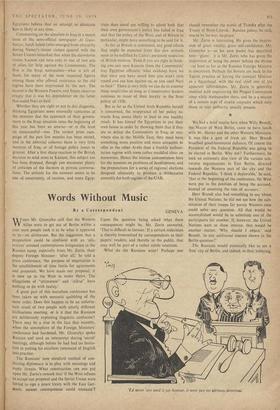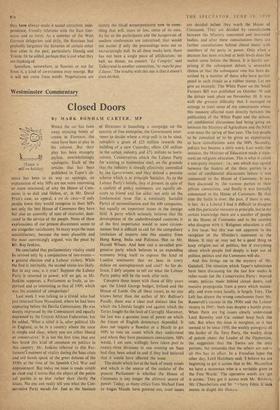Words Without Music
By a Correspondent GENEVA WHEN Mr. Gromyko said that the Western Allies were to get out of Berlin within a year most people took it to be what it appeared to be—an ultimatum. But the suggestion that a proposition could be confused with an 'ulti- matum' aroused contemptuous indignation in the Russian camp, especially from Mr. Zorin, their deputy Foreign Minister: 'after all,' he told a press conference, 'the purpose of negotiation is the establishment of time limits for agreements and proposals. We have made our proposal; it is now up to the West to make theirs. The allegations of "ultimatum" and "diktat" have nothing to do with reality.'
A great part of this marathon conference has been taken up with semantic quibbling of the same order. Does this happen to be an unfortu- nate result of two people with utterly different civilisations meeting; or is it that the Russians are deliberately exploiting linguistic confusion? There may be a clue in the fact that recently, when the atmosphere of the Foreign Ministers' conference had hardened, Mr. Gromyko spoke Russian and used an interpreter during 'secret' meetings, although before he had had no hesita- tion in putting his excellent command of English Into practice.
The Russians' now standard method of con- ducting diplomacy is to play with meanings and imply threats. What construction can one put upon Mr. Zorin's remark that 'if the West refuses to accept our proposal and the Soviet Union were forced to sign a peace treaty with the East Ger- mans, serious consequences could emanate'? Upon the question being asked what these consequences might be, Mr. Zorin answered, 'That is difficult to foresee.' If a certain indecision is thereby transmitted by correspondents to their papers' readers, and thereby to the public, that may well be part of a rather subtle intention.
What do the Russians want? Perhaps one should remember the words of Trotsky after the Treaty of Brest-Litovsk : Russian policy, he said, was to be 'no war, no peace.'
Mr. Zorin is interesting. He gives the impres- sion of great vitality, great self-confidence. Mr. _Gromyko is—as his own leader has described him—'glum' : it is Mr. Zorin who has given the impression of being the power behind the throne —at least as far as the Russian Foreign Ministry is concerned. Perhaps the Soviets are back to the Tsarist practice of having the nominal Minister as a figurehead, with the real chief one of his apparent subordinates. Mr. Zorin is generally credited with engineering the Prague Communist coup while Ambassador there, and he is a master of a certain type of double entendre which only those in real authority usually possess.
We had a brief respite here when Willy Brandt, the Mayor of West Berlin, came to have lunch with Mr. Herter and the other Western Ministers. It was like a gust of fresh air. Herr Brandt breathed good-humoured defiance. Of course the President of the Federal Republic was going to be elected in Berlin. Why not? Furthermore, he took an extremely dim view of the various sub- versive organisations in East Berlin, directed towards the Western part of the city and the Federal Republic. 'I think it deplorable,' he said, 'that at the beginning of the conference, the West were put in the position of being the accused, instead of assuming the role of accusers.'
Herr Brandt also had something to say about the United Nations; he did not see how the sub- stitution of their troops for purely Western ones could solve any question. All that would be accomplished would be to substitute one of the participants for another. If, however, the United Nations were to show interest, that would be another matter. 'Why should I object,' said Brandt, 'to any additional interest shown in the Berlin question?' Herr Brandt also had something to say about the United Nations; he did not see how the sub- stitution of their troops for purely Western ones could solve any question. All that would be accomplished would be to substitute one of the participants for another. If, however, the United Nations were to show interest, that would be another matter. 'Why should I object,' said Brandt, 'to any additional interest shown in the Berlin question?'
The Russians would eventually like to see a 'free' city of Berlin, and indeed, in their lobbying, 'I'd never 'ave used it yer honour, it were just me ultinuac dcrerrem.'
they have always made it sound attractive; inde- pendence, friendly relations with the East Ger- mans and so forth. As a member of the West German delegation said drily, the Russians had probably forgotten the histories of certain other free cities in the past, particularly Danzig and Trieste. Or he added, perhaps that is just what they are thinking of.
Somehow, somewhere, at Summit or not far from it, a kind of co-existence may emerge. But it will not come from words. Negotiations are
merely the ritual accompaniment now to some- thing that will, more or less, come of its own. As far as the participants and the hangers-on of modern conferences are concerned, that would not matter if only the proceedings were not so excruciatingly dull. In all these weeks here, there has not been a single piece of jollification; no ball, no dinner, no concert. 'Le Congres,' said Talleyrand in another connection, 'tte marche pas; it douse.' The trouble with this one is that it doesn't even do that.







































 Previous page
Previous page